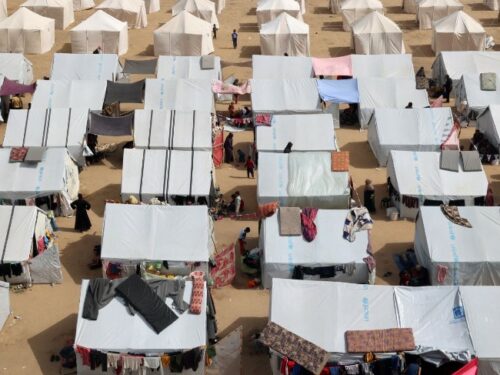On Monday, the Israeli army continued the bombing and shelling of various parts of the Gaza Strip, especially in Rafah, in addition to Khan Younis, in southern Gaza, and several parts of the destroyed coastal region, killing and wounding dozens of Palestinians, including many children and women. Israel escalated Rafah bombing although Hamas accepted a proposed ceasefire deal.
Earlier Article: |Day 213: Israeli Troops Order Eastern Rafah Evacuation; Bombing Continues|
The Israeli army fired missiles at Rafah, killing at least five Palestinians, and wounding many, in the Tal Al-Sultan neighborhood, in the western part of the city.
The Israeli missiles also struck a home for the Abu Amra family, west of Rafah, killing at least three Palestinians, including a child, and wounding dozens.
Many Israeli tanks and armored vehicles advanced towards the Rafah Border Terminal and fired many shells at the terminal’s building.
The army also fired artillery shells at all Palestinian areas around the Rafah Terminal and Karem Abu Salem crossing, in addition to bombing the Salam and the Jneina neighborhoods, while the Air Force fired missiles at many homes, causing many casualties.
Despite talks of a ceasefire deal, and Hamas’s response accepting a deal, Israeli military and political officials said the offensive on Rafah will continue while the Israeli tanks and armored vehicles advanced and are just about 200 meters from the Rafah Border Terminal with Egypt.
Earlier, Hamas’ Political Bureau chief, Ismael Haniyya, informed the mediators in Egypt and Qatar that the movement has accepted the proposal presented by the two countries to reach a ceasefire deal, but did not provide details.
Shortly after Hamas submitted its positive response, Israeli army spokesperson Daniel Hagari told reporters that the army has targeted more than fifty areas in Rafah and is preparing for a ground invasion.
Hagari claimed that Israel is studying the responses of Hamas but added that the army will continue its operations in Gaza, including the ground invasion of Rafah, to, according to him, “return the hostages as soon as possible”, although the army has already killed many Israeli hostages in its ongoing bombing of the coastal enclave.
Israeli opposition leader, Yair Lapid, expressed doubt about the government’s intentions regarding returning the Israeli captives and stated that if the Netanyahu-led government wanted to return the hostages it would be sending its negotiators to Cairo to finalize the deal that was accepted by Hamas.
It is worth mentioning that the Israeli army dropped leaflets on Rafah, demanding the Palestinians to evacuate the eastern area and go to Khan Younis which has already been destroyed due to the constant bombing.
The areas where the army is demanding the Palestinians to flee are densely populated, especially after hundreds of thousands of Palestinians fled to them from northern and central Gaza, and just a night earlier, the army bombarded at least eleven homes, killing and wounding dozens of Palestinians, including children and women, and many who remain under the rubble.
The bombarded areas in Khan Younis and Al-Mawasi, where the army wants the Palestinians to go, are in ruins and there is no space to even install tents and lack basic services and infrastructure due to massive destruction by the Israeli missiles and shells.
The Palestinian Central Bureau of Statistics estimated that around 1.1 million Palestinians, mostly those who fled northern and central Gaza, are in Rafah, living in an area that is only about 63.1 square kilometers.
Since Israel began the ground offensive in the Gaza Strip on October 27, 2023, it has been forcing the Palestinians to leave northern and central Gaza and head to southern Gaza, especially to Rafah, but has also been bombing the fleeing families in what was designated as “safe areas” and pushing them further to the southmost areas of the coastal enclave.
Any invasion of Rafah means dozens of thousands of additional casualties, and the blocking of the Rafah terminal with Egypt, which has been essential in the entry of medical and humanitarian supplies, although in limited numbers due to Israeli attacks and restrictions.
Israel has now killed at least 34.735 Palestinians, including more than 17.873 children and 9.801 women, and injured more than 78.108, mostly women and children, in addition to the thousands who remain under the rubble, since October 7, 2023.

